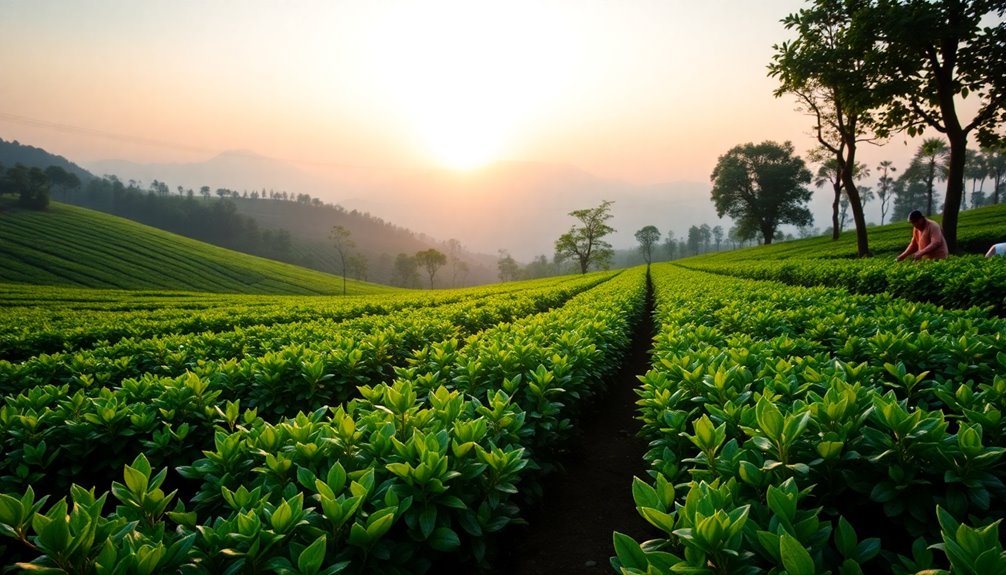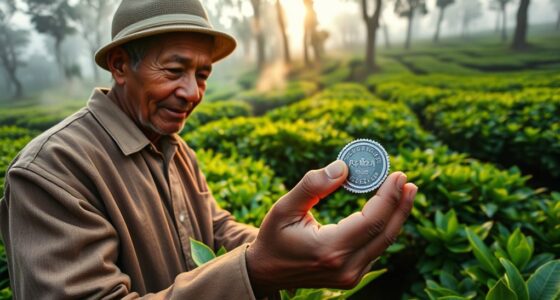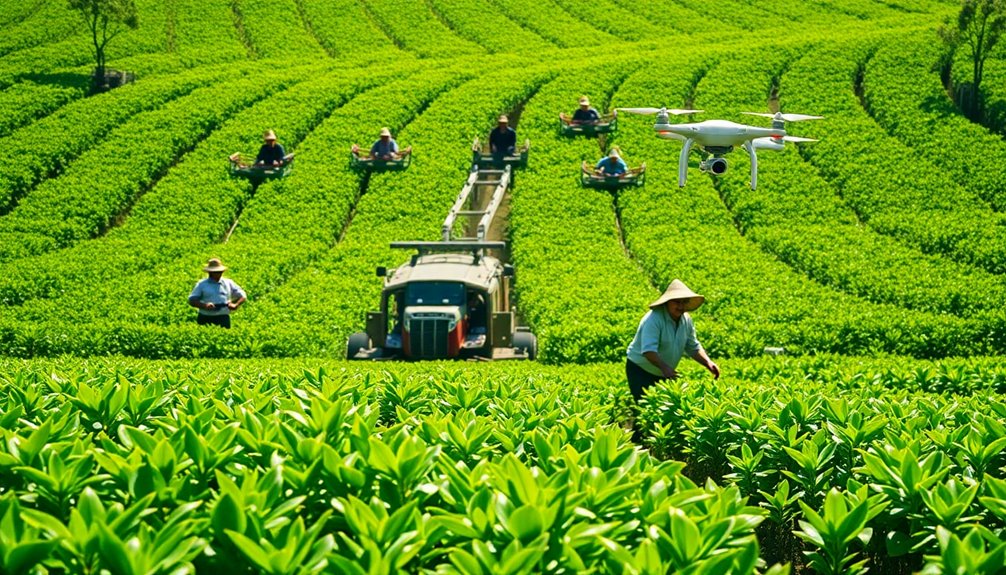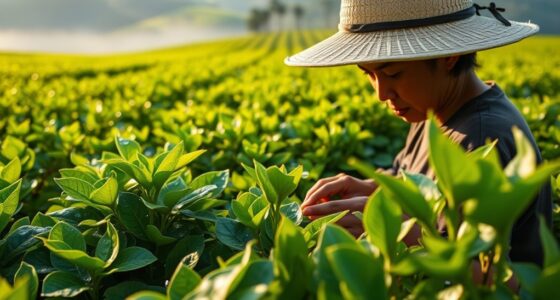Ethical sourcing is shaping the future of tea by focusing on fairness and sustainability. It ensures that tea farmers earn fair wages and work in safe conditions, helping their families thrive. As you enjoy your tea, remember that consumer demand for transparency is growing, which means brands are becoming more responsible. This shift leads to a stronger connection between farmers and their communities, often through cooperatives that provide support and training. Plus, it encourages environmentally friendly practices that protect our planet. Exciting changes are happening in the tea world, and there's so much more to explore!
Key Takeaways
- Ethical sourcing enhances transparency in the tea supply chain, building consumer trust and promoting brand accountability.
- Rising consumer demand for ethically sourced tea leads to a willingness to pay premium prices, driving market growth.
- Fair wages and improved working conditions for tea farmers foster better livelihoods and community development through cooperatives.
- Sustainable farming practices associated with ethical sourcing promote biodiversity, reduce carbon footprints, and support environmental preservation.
- The future of the tea industry will focus on collaboration between brands and farmers, leading to innovations in sustainability and eco-friendly packaging.
Introduction
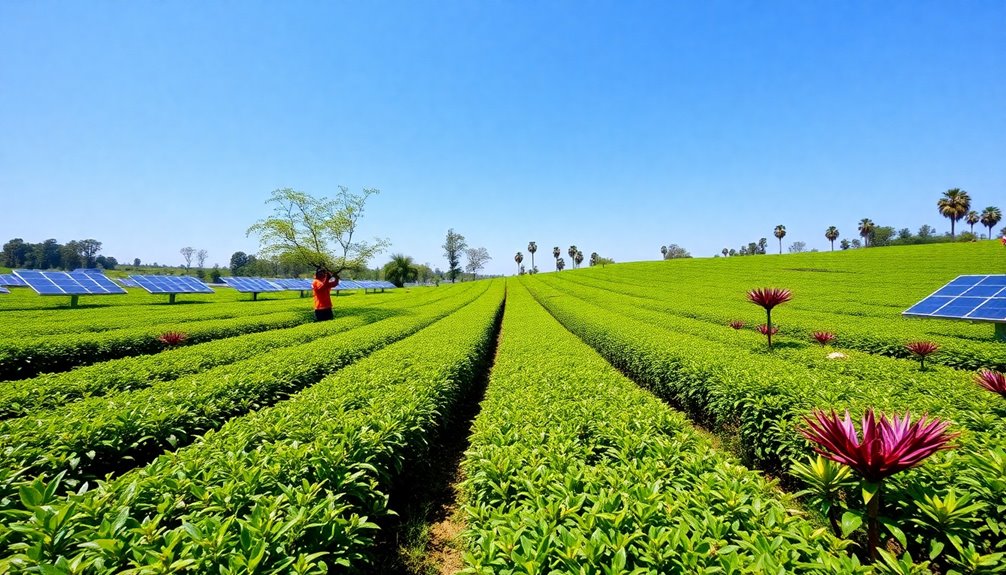
How can ethical sourcing transform the tea industry? It starts with transparency and a commitment to sustainable practices. More and more consumers like you're asking for tea that supports fair wages and better livelihoods for farmers. This change is exciting!
Ethical sourcing means that your tea comes from places where producers are treated fairly and where the land is taken care of through methods like organic farming. In fact, the organic tea market is projected to grow at a CAGR of 5.2% through 2026, indicating a strong consumer demand for sustainable products.
Certifications like Fair Trade and Organic help you identify these responsible brands. They ensure that farmers earn a fair income and can improve their living conditions.
Also, direct trade relationships cut out the middlemen, making it easier for you to support farmers directly. This boosts their livelihoods and creates a more ethical supply chain.
As consumer preferences shift toward sustainably sourced products, the tea industry is evolving. Tea subscription services focusing on ethical brands are becoming more popular, making it easier for you to enjoy a cup of tea that makes a difference. Additionally, many ethical brands are now sourcing teas such as Oolong tea known for its health benefits, further enhancing the appeal of sustainable options.
Ceylon Tea's Unique Flavor Profile
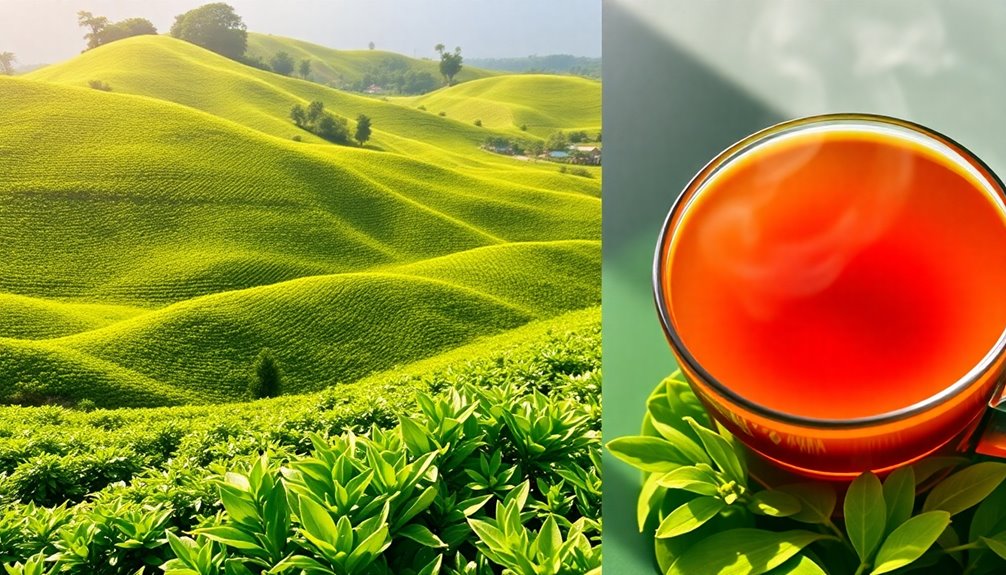
Ceylon tea stands out in the world of beverages, offering a unique flavor profile that truly captivates the senses. This tea, grown in Sri Lanka, has bright and brisk tastes with delightful citrusy notes. These flavors come from the special climate and altitudes of the tea-growing regions. High-grown Ceylon teas are delicate and aromatic, while low-grown varieties are stronger and fuller-bodied.
What makes Ceylon tea even more exciting is the way it's produced. Sustainable farming practices and organic cultivation help enhance its unique flavors. By minimizing chemical inputs, farmers protect soil health and promote biodiversity. When you sip Ceylon tea, you're tasting the care that goes into the tea production.
The time of harvest also plays a big role in flavor. Different picking seasons yield teas that range from light and fragrant in the first flush to rich and robust in later flushes.
This flavor complexity has made Ceylon tea popular worldwide, with many people looking for single-origin varieties that showcase the quality and authenticity of Sri Lankan estates. So, whether you're trying it for the first time or savoring a favorite blend, Ceylon tea is sure to delight!
Consumer Demand for Ethical Sourcing
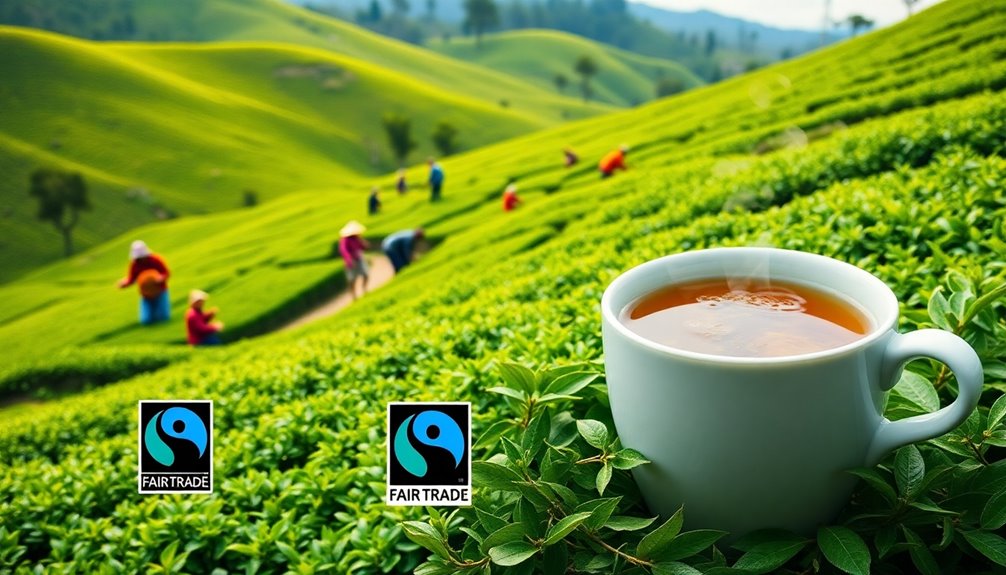
Ethical sourcing has become a key factor in consumers' purchasing decisions, especially in the tea market. You might've noticed that more and more people want to know where their tea comes from. With rising consumer demand for transparency in tea supply chains, many brands are stepping up to provide that information. This shift is exciting!
People are looking for sustainable tea options, like organic tea, which not only taste good but also support fair labor practices. Each cup of ethically sourced tea represents a commitment to making the world a better place. You're part of this change when you choose products that help farmers and support their communities.
Did you know that the global organic tea market was valued at about $930.4 million in 2020? That's a lot of people choosing quality over quantity!
Additionally, tea subscription services focusing on ethical brands are popping up everywhere, making it easier for you to find delicious and responsible options. By choosing ethical sourcing, you're not just enjoying a great cup of tea—you're joining a movement that cares for the planet and its people.
Local Farmers' Cooperative Models

Many consumers are eager to support local farmers and sustainable practices in the tea industry. Local farmers' cooperatives are changing the game for tea growers.
These cooperatives give farmers collective bargaining power, allowing them to negotiate fair prices and skip the middlemen who usually take a big cut of their profits.
By joining forces, farmers gain access to resources and training in sustainable farming practices. This not only improves the quality of their tea but also helps them earn more money and feel more secure.
Plus, cooperatives encourage sharing knowledge, which helps farmers learn about organic tea and other eco-friendly methods.
When tea is sold through these cooperative models, the fair trade premiums earned are reinvested in community development. This means better infrastructure, schools, and healthcare for the tea-growing regions.
Successful examples from places like Assam and Darjeeling show how these cooperatives can uplift farmers' lives and support the tea industry's future.
Labor Rights and Fair Wages
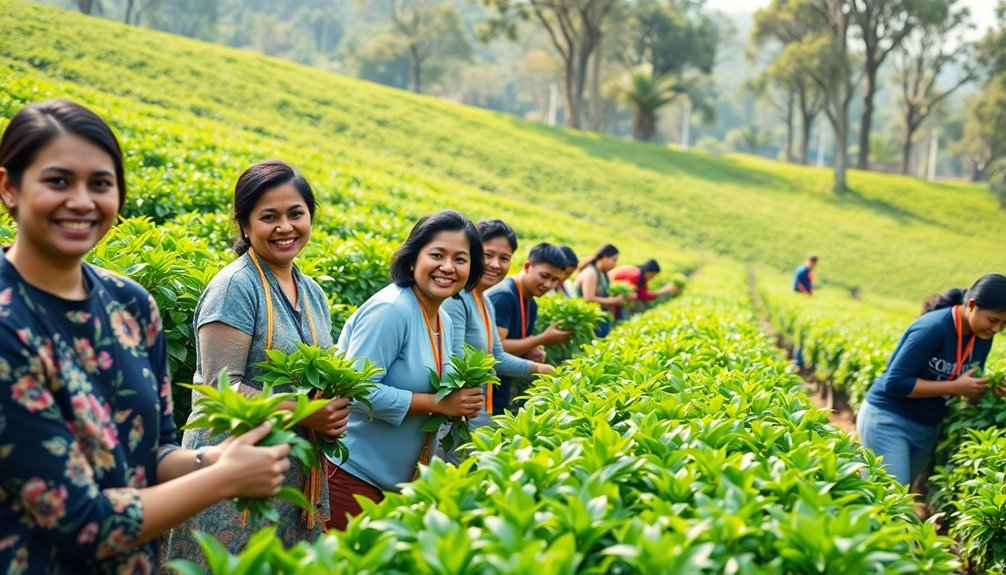
While the tea industry thrives on its rich flavors and aromas, the labor rights of those who cultivate it often go overlooked. Ethical sourcing is changing that! It promotes fair wages and better working conditions for tea producers. One great example is Fair Trade certification, which guarantees a minimum price for farmers, ensuring they earn a decent living.
When you support direct trade relationships, you help eliminate middlemen. This means farmers can keep a larger share of the profits, leading to more financial security.
Plus, the extra money from Fair Trade can be invested in community development projects. This helps improve education and healthcare for workers and their families.
Transparency is also important. Regular audits ensure that labor standards are met, which fosters accountability throughout the tea industry.
Practical Applications
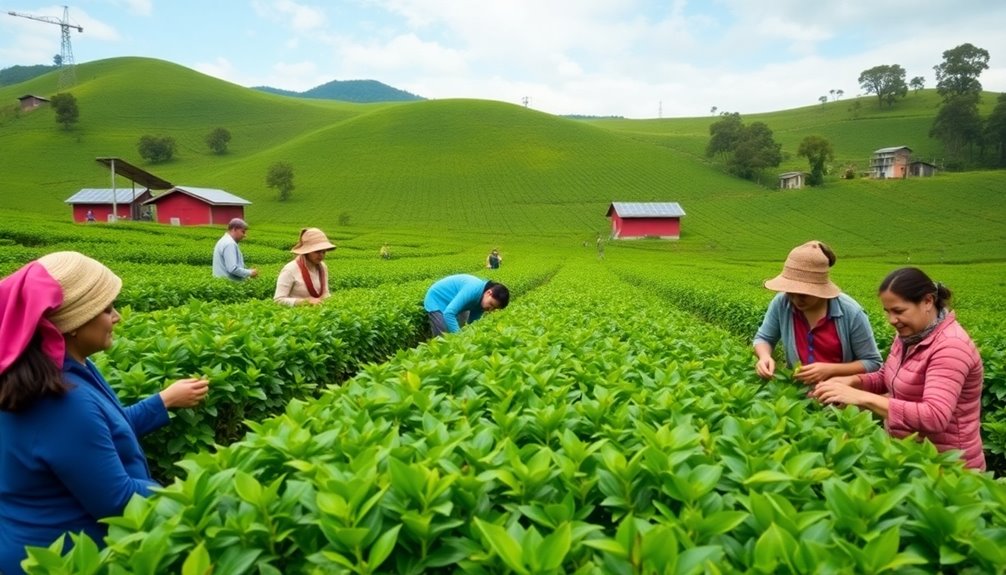
Supporting labor rights and fair wages sets the stage for practical applications that can transform the tea industry. With ethical sourcing at the forefront, you can see how this approach benefits everyone involved. Tea producers build direct trade relationships with smallholder farmers, ensuring fair compensation and improved working conditions. This leads to greater transparency and accountability in the tea supply chain. Additionally, many producers are recognizing the benefits of using essential oils, which can enhance the aromatic experience of tea and contribute to improved indoor air quality. The integration of aromatherapy practices can create a soothing atmosphere, further elevating the tea-drinking experience. Regular use of essential oils for hair growth can also improve overall wellness, complementing the health benefits of tea.
One exciting development is the use of blockchain technology. It allows you to trace your tea from farm to cup, making sure it's ethically sourced. This technology supports sustainable sourcing and helps everyone feel good about their choices.
Plus, many tea producers are switching to organic farming practices, which not only protect the environment but also meet your demand for high-quality teas. Additionally, the incorporation of herbal alternatives can enhance the health benefits associated with tea, promoting skin vitality and overall wellness.
Community development initiatives are blossoming, too! As consumers, your awareness drives change. Educational campaigns and tea subscription services highlight ethical brands, helping you make informed choices.
When you choose sustainably sourced tea, you're supporting fair wages and a brighter future for all. So, let's raise our cups to a more ethical tea industry, one sip at a time!
Frequently Asked Questions
What Is the History of Tea Sourcing Practices?
You'll find that tea sourcing practices have evolved significantly. Initially, it focused on trade routes and colonial exploitation. Over time, attention shifted to quality, sustainability, and fair practices, reflecting changing consumer values and demands.
How Do Climate Changes Impact Tea Sourcing?
Climate change alters weather patterns, affecting tea plants' growth. You'll notice shifts in quality and yields, which can impact availability and prices. Adapting sourcing strategies becomes essential to ensure a sustainable supply of your favorite tea.
Are There Certifications for Ethically Sourced Tea?
Yes, there are certifications for ethically sourced tea. You'll find labels like Fair Trade, Rainforest Alliance, and USDA Organic. These certifications ensure that the tea you buy supports fair labor practices and sustainable farming methods.
What Are the Environmental Benefits of Ethical Sourcing?
When you choose ethically sourced products, you support sustainable farming practices, reduce deforestation, and promote biodiversity. These actions help preserve ecosystems, combat climate change, and ensure healthier environments for future generations. Your choices truly make a difference.
How Can Consumers Identify Ethical Tea Brands?
To identify ethical tea brands, you should look for certifications like Fair Trade or Rainforest Alliance. Research company practices, read labels, and support brands that prioritize sustainable farming, fair wages, and community well-being.
Conclusion
In conclusion, ethical sourcing is making tea even better! By supporting local farmers and ensuring fair wages, we can enjoy our favorite Ceylon tea while helping communities thrive. When you sip that delicious cup, you're also part of something special. It's exciting to know that your choices matter. So next time you grab a tea, remember the good it brings to everyone involved. Together, we can shape a brighter future, one cup at a time!

